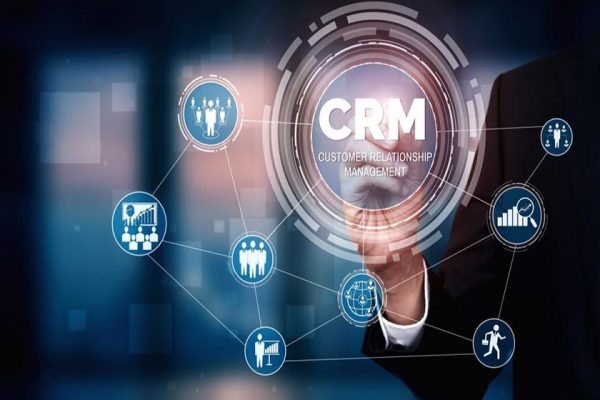In the competitive business landscape, customer relationship management (CRM) systems have become an essential tool for companies looking to gain a competitive edge. A CRM system can help businesses manage their customer interactions, streamline their sales and marketing processes, and improve customer satisfaction.
However, with so many different types of CRM systems available, it can be challenging to know which one is right for your business. In this blog post, we’ll explore what are the different types of CRM systems and the pros and cons of each.
How CRMs Help to Meet Your Business Objective?
CRM systems can help businesses meet their objectives in a variety of ways. Here are some examples:
- Improve customer engagement: CRM systems can help businesses improve customer engagement by providing a 360-degree view of the customer, including their interactions, preferences, and behaviors. This allows businesses to personalize their interactions with customers, offer targeted marketing campaigns, and provide better customer service and support.
- Increase sales effectiveness: It can help businesses increase sales effectiveness by providing real-time visibility into sales pipelines and customer buying patterns. It allows sales teams to identify sales opportunities, prioritize leads, and focus on the most promising prospects. Additionally, CRM systems can automate and streamline sales processes, reducing manual effort and improving efficiency.
- Enhance customer service: It can help businesses enhance customer service by enabling faster response times and more accurate issue resolution. By providing a single source of customer information, CRM systems can help customer service teams quickly access and respond to customer inquiries and issues. Additionally, CRM systems can help businesses track and measure customer satisfaction and identify areas for improvement.
- Improve data management: It can help businesses improve data management by providing a centralized repository for customer data. It allows businesses to manage customer data more effectively, ensure data accuracy and consistency, and reduce data duplication. Additionally, CRM systems can help businesses derive insights from customer data, enabling better decision-making and more effective marketing and sales strategies.
- Streamline business processes: It can help businesses streamline business processes by automating and integrating workflows across different teams and departments. This can reduce manual effort, improve efficiency, and ensure consistency and coherence across different customer touchpoints.
By leveraging these capabilities, CRM systems can help businesses meet their objectives and achieve better business outcomes, such as increased revenue, improved customer satisfaction, and greater operational efficiency.
What Are the Different Types of CRM Systems?
There are several types of CRM systems available in the market, each designed to cater to specific business needs. Here are some of the most common types of CRM systems:
1. Operational CRM
This type of CRM system focuses on automating and streamlining customer-facing business processes such as sales, marketing, and customer service. It helps companies to manage interactions with customers throughout the customer lifecycle, from lead generation to post-sale support.
Pros
- Automates and streamlines business processes, reducing manual effort and improving efficiency.
- Provides a 360-degree view of the customer, allowing teams to personalize customer interactions and improve customer satisfaction.
- Increases sales effectiveness by providing real-time visibility into sales pipelines and customer buying patterns.
- Helps companies to improve customer service by enabling faster response times and more accurate issue resolution.
Cons
- May require significant upfront investment in technology and infrastructure.
- Requires extensive data management and integration efforts to ensure accurate and timely data.
- May be difficult to customize to specific business needs and processes.
2. Analytical CRM
It focuses on analyzing customer data to gain insights into customer behavior, preferences, and needs. It helps companies to understand customer needs better, identify sales opportunities, and improve marketing effectiveness.
Pros
- Provides insights into customer behavior and preferences, enabling companies to personalize marketing campaigns and improve customer segmentation.
- Helps companies to identify sales opportunities and improve sales effectiveness by analyzing customer buying patterns and behaviors.
- Enables companies to measure and track key performance indicators (KPIs) related to customer engagement and satisfaction.
- Can improve customer retention by identifying at-risk customers and offering targeted retention campaigns.
Cons
- Requires extensive data management and integration efforts to ensure accurate and timely data.
- May require significant investment in analytics technology and expertise.
- May be difficult to derive actionable insights from the data without proper expertise and resources.
3. Collaborative CRM
This type of CRM system focuses on improving communication and collaboration between different teams within an organization, such as sales, marketing, and customer service. It helps companies to share customer information, coordinate customer interactions, and improve cross-functional processes.
Pros
- Improves communication and collaboration between different teams within an organization, leading to better customer experiences and outcomes.
- Helps to ensure consistency and coherence across different customer touchpoints.
- Enables companies to respond to customer inquiries and issues faster and more accurately.
- Can improve customer retention by identifying and addressing customer issues and concerns more effectively.
Cons
- Requires extensive collaboration and coordination efforts across different teams and departments.
- May require significant investment in technology and training to ensure effective collaboration.
- May be difficult to implement in organizations with siloed or hierarchical structures.
4. Strategic CRM
This type of CRM system focuses on developing long-term customer relationships by creating a personalized customer experience. It helps companies to align their business strategy with customer needs and preferences, and to identify high-value customers.
Pros
- Enables companies to develop long-term customer relationships and increase customer lifetime value.
- Allows companies to tailor their offerings and services to specific customer segments and needs.
- Provides a more personalized and differentiated customer experience, leading to higher customer satisfaction and loyalty.
- Helps to identify and prioritize high-value customers, leading to increased revenue and profitability.
Cons
- May require significant investment in technology and expertise to implement.
- May require significant data management and integration efforts to ensure accurate and timely data.
- May be difficult to align with business strategy and objectives.
5. Mobile CRM
It is designed for mobile devices such as smartphones and tablets. It enables sales teams to access customer information on the go, collaborate with colleagues in real-time, and manage customer interactions from anywhere.
Each type of CRM system has its own set of features and benefits, and choosing the right one depends on the specific needs of your business.
Pros
- Enables sales teams to access customer information and collaborate with colleagues in real-time, leading to better customer experiences and outcomes.
- Allows teams to manage customer interactions from anywhere, improving responsiveness and agility.
- Provides real-time visibility into sales pipelines and customer buying patterns, leading to better sales effectiveness.
- Increases efficiency and productivity by reducing manual effort and paperwork.
Cons
- May require significant investment in mobile technology and infrastructure.
- May require significant data management and integration efforts to ensure accurate and timely data.
- May be difficult to ensure data security and privacy on mobile devices.
Keys to Know Which Types of CRM You Need
Choosing the right type of CRM system for your business depends on several factors. Here are some key considerations that can help you determine which type of CRM system you need:
1. Business Objectives
Determine your company’s overall business objectives and goals, and identify which CRM capabilities can help you achieve them.
For example, if you want to improve sales effectiveness, you may need an operational CRM system that can automate and streamline your sales processes.
2. Customer Needs
Understand your customers’ needs, preferences, and behaviors, and identify which CRM capabilities can help you better serve them.
For example, if you want to provide a personalized customer experience, you may need a strategic CRM system that can help you tailor your offerings and services to specific customer segments.
3. Data Management
Evaluate your data management capabilities and identify which CRM capabilities can help you manage customer data more effectively.
For example, if you have a lot of customer data that needs to be analyzed, you may need an analytical CRM system that can help you derive insights from your data.
4. Team Collaboration
Assess how your teams collaborate and communicate with each other, and identify which CRM capabilities can help you improve cross-functional collaboration.
For example, if your sales and marketing teams need to work more closely together, you may need a collaborative CRM system that can help them share customer information and coordinate customer interactions.
5. Mobility
Determine how your teams work and interact with customers on the go, and identify which CRM capabilities can help you support mobile and remote work.
For example, if your sales teams need to access customer information on their mobile devices, you may need a mobile CRM system that can provide real-time visibility into sales pipelines and customer data.
By considering these key factors, you can determine which type of CRM system is best suited to your business needs and objectives.
Why HubSpot CRM?
There are several reasons why businesses choose HubSpot CRM, including:
- Free to use: HubSpot CRM is completely free to use, which makes it a great option for small businesses and startups that may not have the budget for a paid CRM system.
- All-in-one solution: It offers a suite of tools that can help businesses manage their sales, marketing, and customer service activities from a single platform. This can improve efficiency and reduce the need for multiple software tools.
- User-friendly: It is known for its ease of use and intuitive interface. This makes it easy for users of all skill levels to get started with the platform and begin seeing results quickly.
- Integrations: It integrates with a wide range of other tools and platforms, such as email marketing tools, social media platforms, and e-commerce platforms. This can help businesses connect all their different systems and data sources, improving visibility and collaboration.
- Automation: It offers a range of automation features that can help businesses automate routine tasks and workflows, such as lead scoring, lead nurturing, and sales follow-up. This can save time and improve efficiency, allowing teams to focus on higher-value activities.
- Reporting and analytics: HubSpot CRM provides a range of reporting and analytics tools that can help businesses track and measure their performance across different metrics, such as sales pipeline, website traffic, and customer satisfaction. This can enable better decision-making and more effective strategies.
Summary
Choosing the right type of CRM system for your business is essential to achieving your objectives and staying ahead of the competition.
Whether you need an operational CRM to streamline your sales processes, a strategic CRM to provide a personalized customer experience, or an analytical CRM to derive insights from customer data, there is a CRM system out there that can meet your needs.
By carefully evaluating your business objectives, customer needs, data management capabilities, team collaboration, and mobility requirements, you can choose the CRM system that’s best suited to your business.
With the right CRM system in place, you can drive better customer engagement, increase sales effectiveness, enhance customer service, and achieve your business goals. We hope now you know what are the different types of CRM systems.





